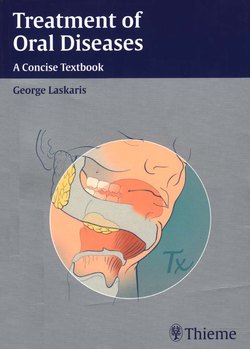Читать книгу Treatment of Oral Diseases - George Laskaris - Страница 38
На сайте Литреса книга снята с продажи.
ОглавлениеContact Cheilitis
Definition
Contact cheilitis is an acute or chronic inflammatory disorder of the lips resulting from contact with various allergens or irritants.
Etiology
The most common causes are lipsticks, lip salves, toothpastes, mouthwashes, foods, etc.
Main Clinical Features
•Mild edema and erythema, followed by scaling and fissures or plaques
•Dryness and a burning sensation are common
•Rarely blisters may develop
•Angular cheilitis is usually present
Diagnosis
A careful medical history is important to determine the probable cause. Patch testing is the standard to confirm the diagnosis.
Differential Diagnosis
•Exfoliative cheilitis
•Plasma cell cheilitis
•Actinic cheilitis
•Herpes simplex
•Lip licking cheilitis
Treatment
Basic Guidelines
•It is important to attempt to identify the causative allergen before treatment.
•Once the allergens have been identified, the patient should avoid them.
•The physician should note down information on all of the probable allergens.
Suggested Therapies
•Systemic oral corticosteroids, e.g., prednisone 20-30 mg/day for 1-2 weeks and then tapering the dose and finally stopping it in 2-3 weeks is the first-line treatment, particularly in severe cases.
•Topical corticosteroids, e.g., a low potency ointment for about 2-3 weeks may control the disease, particularly in mild cases. However, the clinician should be aware of the possibility of allergy to local corticosteroid therapy. It should be suspected when the topical treatment fails to cure the condition or an exacerbation occurs after the use of corticosteroids.
References
Boffa MJ, Wilkinson SM, Beck HM. Screening for corticosteroid contact hypersensitivity. Contact Dermatol 1995;33:149–151.
Cohen DE, Brancaccio R. What is new in clinical research in contact dermatitis. Dermatol Clin 1997;15:137–148.
Freeman S, Stephens R. Cheilitis: Analysis of 75 cases referred to a contact dermatitis clinic. Am J Contact Dermatol 1999;10:198–200.
Holmes G, Freeman S. Cheilitis caused by contact urticaria to mind flavoured toothpaste. Australas J Dermatol 2001;42:43–45.
Riera Ras P, Ras Monleon RM. Management of contact cheilitis in primary care. Aten Primaria 1998;15:53–58.
